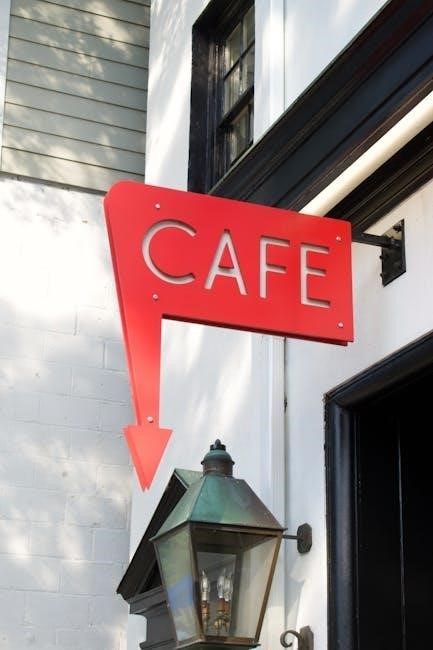The Hospitality General Award Pay Guide outlines minimum wages, allowances, penalty rates, and overtime for employees in the hospitality industry, updated annually by the Fair Work Commission.
1.1. Overview of the Hospitality Industry (General) Award 2020
The Hospitality Industry (General) Award 2020 sets minimum pay rates, classifications, and conditions for employees in restaurants, hotels, and other hospitality sectors. It applies to full-time, part-time, and casual workers, ensuring fair compensation and entitlements. The award is updated annually, with 2025 rates effective from 1 July. This guide provides a summary of key entitlements to help employers and employees understand their rights and obligations.
1.2. Purpose of the Pay Guide
The purpose of the Hospitality General Award Pay Guide is to provide clear, comprehensive information on minimum pay rates, entitlements, and compliance requirements. It ensures employers and employees understand their obligations and rights under the Hospitality Industry (General) Award 2020. The guide aids in accurate pay calculations, promotes fairness, and ensures adherence to legal standards, serving as an essential resource for the hospitality sector with regular updates.
1.3. Key Components Covered in the Guide
The Hospitality General Award Pay Guide outlines minimum pay rates, classifications, penalty rates, overtime, casual loadings, and allowances. It details annual salary calculations, compliance requirements, and record-keeping obligations. The guide also covers tools for pay calculations, industry-specific variations, recent updates, common mistakes, and best practices for employers to ensure accurate and lawful payment practices within the hospitality sector.

Understanding Pay Rates Under the Hospitality Award
This section explains the structure of pay rates, including minimum wages, employee classifications, penalty rates, overtime, and annual salary calculations, ensuring compliance with the award’s requirements.
2.1. Minimum Rates of Pay
The minimum rates of pay under the Hospitality General Award are the lowest amounts employers must pay employees, based on their role, experience, and whether they are full-time, part-time, or casual. These rates are set by the Fair Work Commission and updated annually to reflect economic conditions. They apply to all employees covered by the award and cannot be undercut, ensuring fair compensation across the hospitality industry.
2.2. Levels and Classifications of Employees
The Hospitality General Award categorizes employees into distinct levels and classifications based on their roles, responsibilities, and skills. These classifications determine the applicable pay rates and entitlements. Employers must accurately classify employees to ensure compliance with the award and fair compensation. Misclassification can lead to underpayment and legal issues, making it crucial to understand and apply these categories correctly.
2.3; Annual Salary Rates and Their Calculation
Annual salary rates under the Hospitality General Award are calculated by multiplying the hourly rate by the number of ordinary hours worked per week, then by 52 weeks. The Fair Work Commission sets these rates, ensuring they reflect the minimum entitlements for each classification. Employers must ensure annual salaries comply with the award and are adjusted for any changes in pay rates or conditions.
2.4. How Pay Rates Are Updated Annually
Pay rates under the Hospitality General Award are updated annually, typically effective from 1 July, following the Fair Work Commission’s wage review. Increases are based on economic factors, industry conditions, and the Commission’s determination. Employers must adjust their pay rates accordingly to ensure compliance, reflecting any changes to minimum wages, allowances, or penalties. This ensures fair compensation aligned with current standards.

Penalty Rates and Overtime
This section explains penalty rates and overtime provisions, detailing how additional pay applies for work outside standard hours, ensuring fair compensation for evening, weekend, and excess hours.
3.1. Definition and Application of Penalty Rates
Penalty rates are additional payments for work performed during specific times, such as weekends, public holidays, or late nights. These rates apply to compensate employees for inconvenience and are calculated as percentages added to base pay. They vary based on the day and time worked, ensuring fair compensation for less desirable shifts. Employers must apply these rates as per the Award’s provisions.
3.2. Overtime Rates and Conditions
Overtime rates apply when employees work beyond standard hours, typically exceeding 38 hours per week or outside rostered shifts. Under the Hospitality Award, overtime is paid at 1.5 times the base rate for the first three hours and double the base rate thereafter. Specific conditions, such as minimum hours and break requirements, must be met before overtime is payable. Employers must ensure compliance with these provisions.
3.3. Specific Penalty Rates for Weekends and Nights
Weekend penalty rates apply to work performed on Saturdays and Sundays. Saturday rates are typically 1.5 times the base rate, while Sunday rates are 2 times the base rate. Night shift penalties apply for work between midnight and 7am, with an additional 10-15% loading. These rates vary depending on the employee’s classification and the specific employer’s requirements. Compliance with these rates is essential for fairness.
3.4. Midnight to 7am Penalty Rates
Midnight to 7am penalty rates apply to shifts worked during late-night hours. Employees receive an additional 10-15% loading on top of their base rate for work performed between these hours. This rate is designed to compensate for the inconvenience of working late shifts. It applies to all employees covered by the award, regardless of their classification or employment type, ensuring fair compensation for overnight work.

Casual Loading and Casual Employee Entitlements
Casual loading is a 25% addition to base rates, compensating for benefits like annual leave. Casual employees also receive specific penalties and entitlements under the award.
4.1. Casual Loading Rates and Their Application
Casual loading rates under the Hospitality Award are set at 25% of the base rate, applied to all hours worked. This loading compensates casual employees for benefits like annual leave and sick leave. Employers must apply this rate to casual staff, ensuring it is paid on top of the minimum hourly rate for each hour worked, adhering to the Award’s compliance standards.
4.2. Additional Penalty Rates for Casual Employees
Casual employees under the Hospitality Award are entitled to additional penalty rates, including 50% for Saturdays and 75% for Sundays. Public holiday rates also apply, with higher penalties for work on these days; These rates are calculated on top of the casual loading, ensuring fair compensation for less desirable working hours and conditions.
4.3. Calculating Casual Employee Pay
To calculate casual employee pay, start with the base hourly rate and apply a 25% casual loading. Add any penalty rates for specific days or times, such as 50% for Saturdays and 75% for Sundays. Sum these amounts and multiply by the hours worked. Ensure compliance with record-keeping and provide detailed payslips. Use tools like payroll software to automate and ensure accuracy in calculations.

Allowances Under the Hospitality Award
This section outlines the various allowances provided under the Hospitality Award, covering expenses like uniforms, meals, and travel, as well as compensation for specific working conditions.
5.1. Types of Allowances Covered
The Hospitality Award covers various allowances to compensate employees for specific work-related expenses or conditions. These include uniform maintenance, meal allowances, and travel expenses. Additional allowances apply for roles requiring special responsibilities, such as handling cash or working in remote locations. These provisions ensure employees are fairly reimbursed for work-related costs and challenges.
5.2. How Allowances Are Calculated
Allowances under the Hospitality Award are calculated based on specific conditions, such as hours worked, role requirements, or expenses incurred. They are typically tied to the employee’s hourly rate or a fixed amount per shift. Calculations must align with the Award’s standardized rates, ensuring transparency and fairness. Employers must document and apply these payments accurately to avoid compliance issues.
5.3. Specific Allowances for Hospitality Roles
The Hospitality Award includes specific allowances tailored to different roles, ensuring fair compensation for unique demands. Chefs may receive allowances for maintaining hygiene standards, while housekeeping staff might get allowances for handling heavy linens. Porters may receive allowances for luggage handling. These role-specific allowances ensure employees are fairly compensated for their responsibilities, fostering equity across the industry.
Loaded Rates and Salary Absorption
Loaded rates combine base pay and entitlements like penalties and allowances into a single rate. Salary absorption ensures employees’ total pay remains consistent when rates or entitlements change.
6.1. What Are Loaded Rates?
Loaded rates are all-inclusive payment rates that combine base pay, penalty rates, and allowances into a single hourly or weekly rate. They simplify payroll processes by incorporating entitlements like overtime, weekends, and night shifts. Employers use loaded rates to ensure compliance with the Hospitality Award while streamlining payments. Employees benefit from transparent, predictable earnings. Loaded rates must be calculated carefully to avoid underpayment and ensure fairness for all staff.
6.2. Salary Absorption for Hotel Managers
Salary absorption for hotel managers involves incorporating specific award entitlements, such as overtime or penalty rates, into their annual salary. This practice simplifies payroll by bundling payments, ensuring compliance with the Hospitality Award. Employers must ensure absorbed amounts meet minimum requirements and maintain accurate records. This arrangement benefits managers with predictable income while streamlining employer obligations, provided all entitlements are fully covered.
6.3. Compliance Requirements for Loaded Rates
Employers must ensure loaded rates comply with the Hospitality Award, covering all entitlements like allowances and penalties. Rates must meet minimum wage requirements, and documentation must detail how loaded rates are calculated. Employers are responsible for ensuring transparency and accuracy in payments. Regular audits and maintaining detailed records are essential to avoid non-compliance issues and potential penalties under the Fair Work Act.
Compliance and Legal Obligations
Employers must adhere to the Fair Work Act, ensuring accurate payments and maintaining detailed records. Transparency and accountability are crucial to avoid penalties for non-compliance with legal requirements.
7.1. Employer Responsibilities Under the Award
Employers must comply with the Hospitality Industry (General) Award 2020, ensuring accurate payment of wages, allowances, and penalties. They must maintain precise records, provide payslips, and adhere to Fair Work Act requirements. Employers are responsible for understanding and applying correct classifications, pay rates, and conditions to avoid legal breaches and ensure fairness for all employees under the Award.
7.2. Record-Keeping and Pay Slip Requirements
Employers must maintain accurate records, including employee details, hours worked, pay rates, and deductions. Pay slips must be issued within one working day of payment, detailing gross and net pay, tax, and superannuation. Records must be retained for seven years and be accessible for audits. Compliance with these requirements ensures transparency and accountability under the Hospitality Industry (General) Award 2020.
7.3. Consequences of Non-Compliance
Non-compliance with the Hospitality Industry (General) Award 2020 can result in legal action, fines, and penalties. Employers may face audits, back-pay claims, and legal disputes. Severe breaches can damage business reputation and lead to financial losses. Compliance is essential to avoid scrutiny from regulatory bodies like the Fair Work Ombudsman and ensure fair treatment of employees under the award.

Tools for Calculating Pay Rates and Entitlements
This section provides essential tools and resources for accurately calculating pay rates and entitlements under the Hospitality Award, ensuring compliance and fairness for all employees.
8.1; Fair Work Commission’s Pay and Conditions Tool
The Fair Work Commission’s Pay and Conditions Tool is an online resource designed to help employers and employees calculate accurate pay rates and entitlements under the Hospitality Award. It provides detailed information on minimum wages, penalty rates, and allowances, ensuring compliance with the latest industrial relations laws and regulations.
8.2. How to Use the Tool for Accurate Calculations
To use the Fair Work Commission’s tool effectively, select the Hospitality Industry (General) Award, enter the employee’s role, classification level, and hours worked. Specify if the employee is full-time, part-time, or casual. Input any overtime or penalty rate scenarios. The tool calculates the correct pay, including allowances and loadings, ensuring compliance with the award’s requirements. Regular updates ensure accuracy and adherence to current regulations.
8.3. Additional Resources for Employers and Employees
Beyond the Fair Work tool, employers and employees can access the Hospitality Industry (General) Award 2020 document on the Fair Work website. Additional resources include the Fair Work Ombudsman’s hospitality industry page, which offers guides, webinars, and FAQs. Employers can also refer to industry associations like the Australian Hospitality Association for tailored advice and compliance support.

Industry-Specific Pay Rates and Variations
Hospitality pay rates vary across sectors like restaurants, hotels, and cafes. Rates differ based on role, industry segment, and specific employer requirements or agreements.
9.1. Restaurant and Catering Rates
Restaurant and catering staff rates vary by role, with chefs, waitstaff, and kitchen hands having distinct pay scales. Minimum rates are set by the Award, but variations occur based on location, employer size, and specific industry agreements; For example, metropolitan areas may have higher rates compared to regional locations due to differing cost-of-living factors and market demands.
9.2. Hotel and Accommodation Rates
Hotel and accommodation rates under the Hospitality Award are structured to reflect varying roles, such as front desk staff, housekeeping, and management. Rates are influenced by factors like property size, star ratings, and location. For instance, luxury hotels may offer higher pay to align with service expectations and operational demands. These rates are regularly updated to ensure fairness and industry standards.
9.3. Variations for Different Roles and Levels
Pay rates vary significantly across different roles and levels within the hospitality industry. For example, junior staff, such as kitchen attendants or cleaners, start at lower rates, while experienced professionals like chefs or duty managers receive higher wages. Senior roles, including hotel managers and executive chefs, are placed on higher pay scales, reflecting their expertise and responsibilities. These variations ensure fair compensation based on skill and experience.

Recent Updates to the Hospitality Award
The Fair Work Commission regularly updates the Hospitality Award to reflect industry needs and wage reviews, ensuring fair pay rates, penalties, and allowances for all employees.
10.1. Changes Effective from 1 July 2025
From 1 July 2025, the Hospitality General Award will introduce updated pay rates, reflecting annual wage reviews. Key changes include adjustments to minimum rates, penalty rate calculations, and specific allowances. Employers must ensure compliance with these changes to avoid legal issues and maintain fair workplace practices across the hospitality sector.
- Minimum pay rates will increase to align with cost-of-living adjustments.
- Penalty rates for weekends and nights will be recalibrated.
- Certain allowances, such as meals and uniform maintenance, will see adjustments.
10.2. Impact of Annual Wage Reviews
Annual wage reviews ensure fair pay adjustments, reflecting economic conditions and cost-of-living increases. These reviews impact minimum rates, penalty rates, and allowances, maintaining wage growth across the hospitality sector. Employers must adjust payrolls accordingly, while employees benefit from updated entitlements aligned with current economic standards.
- Reviews ensure wages keep pace with inflation and living costs.
- Adjustments apply to both base rates and penalty calculations.
- Changes are implemented to maintain workplace fairness and compliance.
- Adjustments will reflect evolving workplace and economic factors.
- Stakeholder input will influence future wage determinations.
- Employers are encouraged to monitor updates for compliance.
- Misclassification of employees leading to incorrect pay rates.
- Failure to apply penalty rates for weekends and nights.
- Not accounting for casual loadings in calculations.
- Inaccurate job classifications lead to pay discrepancies.
- Examples include assigning higher or lower levels than appropriate.
- Consequences include legal risks and employee dissatisfaction.
- Common errors include miscalculating weekend or night shift penalties.
- Incorrect application can lead to underpayment or overpayment.
- Consequences include legal risks and employee dissatisfaction.
- Casual loadings are mandatory for all casual employees.
- Omission leads to underpayment and compliance breaches.
- Regular audits help prevent such errors.
- Adhere to Award requirements for pay and entitlements.
- Maintain accurate records for compliance.
- Communicate pay changes clearly to employees.
- Conduct audits quarterly or bi-annually.
- Review pay slips and employee classifications.
- Ensure compliance with penalty rates and allowances.
- Conduct training on Hospitality Award updates.
- Focus on pay calculations and compliance.
- Include sessions on penalty rates and entitlements.
- Use multiple channels for updates.
- Explain impacts on pay and entitlements.
- Maintain open lines of communication.
10.3. Future Determinations and Adjustments
Future adjustments to the Hospitality Award will be shaped by economic conditions, industry feedback, and regulatory reviews. The Fair Work Commission will continue to assess wage levels, ensuring they align with modern workplace needs. Employers must stay informed about updates to remain compliant, adapting pay structures as new determinations are released to maintain fairness and industry competitiveness.

Common Mistakes in Pay Rate Calculations
Common errors include misclassifying employees, miscalculating overtime, and failing to apply correct penalty rates for weekends and nights. Ensuring accurate classifications and rate applications is essential.
11.1. Misclassification of Employees
Employee misclassification is a common error, leading to incorrect pay rates and legal issues. It occurs when workers are assigned the wrong classification level, such as labeling a chef as a kitchenhand. This can result in underpayment or overpayment. Employers must ensure accurate job classifications align with the Hospitality Award’s requirements. Regular audits and training can help prevent this mistake and ensure compliance with wage regulations.
11.2. Incorrect Application of Penalty Rates
Incorrectly applying penalty rates is a frequent mistake, leading to underpayment or overpayment of staff. Penalty rates apply to specific conditions like weekends, nights, or public holidays. Errors often occur due to miscalculating percentages or misapplying rate multipliers. Employers must ensure correct rate application, as discrepancies can result in legal issues or employee disputes. Regular reviews and staff training are essential to avoid such errors.
11.3. Failure to Account for Casual Loadings
Failure to include casual loadings in employee pay is a common error, leading to underpayment. Casual loadings compensate for benefits like leave entitlements. Employers must add the correct percentage to casual rates. Omitting this can result in non-compliance and financial penalties. Regular audits and payroll reviews are essential to ensure accurate payment and avoid legal issues.

Employer Obligations and Best Practices
Employers must adhere to the Hospitality Award, ensuring accurate pay rates, maintaining records, and communicating changes. Regular audits and training promote compliance, fostering a transparent workplace culture.
12.1. Regular Audits of Pay Practices
Employers must conduct regular audits of pay practices to ensure compliance with the Hospitality Award. This includes verifying pay rates, classifications, and entitlements. Regular checks help identify discrepancies, prevent underpayments, and ensure transparency. Employers should maintain detailed records and address any issues promptly to avoid legal consequences and foster trust with employees.
12.2. Training for HR and Payroll Teams
Regular training for HR and payroll teams is essential to ensure accurate pay calculations and compliance with the Hospitality Award. Employers must provide updates on award changes, penalty rates, and entitlements. Training sessions should cover compliance requirements, pay rate calculations, and record-keeping standards to minimize errors and ensure transparency.
12.3. Communicating Changes to Employees
Effective communication of award changes to employees ensures transparency and trust. Employers should provide clear updates via staff meetings, emails, or pay slip notes. This includes explaining how changes affect pay rates, allowances, and entitlements. Regular updates help employees understand their rights and any adjustments to their compensation.
